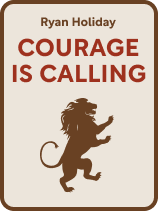

This article is an excerpt from the Shortform book guide to "Courage Is Calling" by Ryan Holiday. Shortform has the world's best summaries and analyses of books you should be reading.
Like this article? Sign up for a free trial here.
Should you make a decision before you have all of the information? How should you balance risk and safety in the decision-making process?
In Courage Is Calling, Ryan Holiday gives advice on accepting uncertainty and being bold in decision-making in the style of ancient Stoic philosophy. This involves embracing uncertainty and making choices before they’re made for you.
Continue reading to learn about making brave decisions, the Stoic way.
Embrace Uncertainty
Holiday argues that courage requires you to be decisive. You can’t predict the future, so deliberating about decisions for a long time won’t help. To move forward, you have to accept uncertainty and make brave decisions, trusting that your choices will work out.
Maybe you’ve always wanted to quit your desk job to run your own business, or you’ve always wanted to live in another country. You may or may not succeed, but Holiday says to do it anyway. Simple, everyday existence brings many risks, so it’s pointless to always prioritize safety. Sometimes you need to sacrifice your security so you can evolve and grow.
(Shortform note: Changing your life sometimes requires a leap of faith. Maybe parts of your life are no longer fulfilling, or your current circumstances are no longer meeting your needs. To start down a different path, you have to believe in yourself and trust your vision of who, what, and where you want to be in the future. However, you shouldn’t rely on blind faith that everything will work out. Use the strengths, knowledge, and skills you already have to build your new life and draw on support from loved ones to help you in your efforts.)
Make a Choice So It Isn’t Made for You
Don’t spend all your time afraid to make the wrong decision. Instead, have the courage to be bold and decisive. When you spend too long analyzing possible outcomes, Holiday asserts that your inaction chooses for you.
One example of this would be choosing not to vote in your country’s elections even though you’re eligible. When you don’t vote, you’re essentially choosing the candidates who win and the laws that get passed, regardless of whether you’d have supported them with your vote or not.
| Create a Pattern of Bold Action It’s easy to fall into a pattern of inaction. As we’ve discussed, the alternative—being bold and decisive like Holiday suggests—often means we have to leave our comfort zones. If you never leave your comfort zone, you never move forward. Here are some steps for developing a pattern of making bold choices: 1. Think about what the consequences of inaction will be. Ask yourself whether the benefits of taking action will outweigh your reasons not to act. 2. Take accountability for the things you do and the things you don’t do. We’re equally responsible for both. 3. Think about what you’d say to a friend in the same situation, and follow your own advice. Examining the situation from the outside might give you some needed objectivity. 4. Listen to your intuition. If you have strong feelings about something, they’ll probably guide you in the right direction. |
Not making choices can have dangerous consequences when the stakes of your decisions are high. For example, if you witness injustices in your community and you don’t speak out or act against them, then you’re playing a part in their continued existence. Silence means you choose to accept the current reality.
| When Small Decisions Have Big Consequences In high-stakes situations involving people’s lives and livelihoods, the price of inaction is clear: There’ll be immediate suffering if you make a cowardly choice. However, inaction can also be dangerous when the stakes seem low. Every day, we face choices that call on us to be brave. You may think choosing the easy route instead of the courageous route once in a while won’t make a difference, but according to the authors of How Will You Measure Your Life?, your integrity is made up of small decisions accumulated over time, not just the high-stakes moments. If you focus only on the short-term cost or benefits of your actions, you’ll fail to grasp their full consequences. Making a cowardly choice one time can easily lead to a pattern of cowardice, so do the right thing all the time, no matter the circumstances. For example, if you lie to a friend, you may escape an uncomfortable situation in the short term, but you’re setting up a bigger issue down the road. |
Exercise: Start Making Brave Decisions in Your Everyday Life
Holiday asserts that the path to a courageous life starts with making small, brave decisions every day. Reflect on how you can start incorporating courageous actions into your everyday life.
- Describe an action or a decision you’ve been avoiding because you’re afraid. (For example, you might fear having a difficult conversation with a friend, visiting a new country for the first time, or asking for a raise.)
- Now, describe the likeliest consequences of you continuing to avoid the thing you fear. (For example, your friendship will struggle, you’ll regret missing a chance to travel, or you’ll continue making less money than you deserve.)
- What’s one step you can take toward overcoming your fear? (For example, you might prepare a script for talking to your friend, book a plane ticket, or set up a meeting with your boss.)

———End of Preview———
Like what you just read? Read the rest of the world's best book summary and analysis of Ryan Holiday's "Courage Is Calling" at Shortform.
Here's what you'll find in our full Courage Is Calling summary:
- Ryan Holiday's advice for how to be courageous in any situation
- How to break free from the fear of what other people think of you
- How to take control of your actions and make difficult decisions





